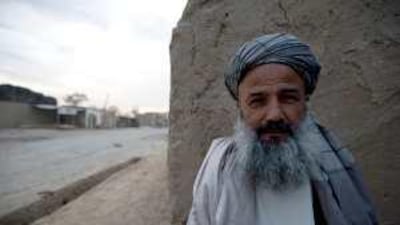KUNDUZ // To start a conversation, Sardar Aras declared that God had saved him yesterday. He was with some friends, he explained, when a roadside bomb hit a passing Afghan military convoy. "We jumped and lay on the ground. No one from the village, the police or the army came to help. These people were humans, they may have been dead or injured, but no one cared," he said. "Of course the villagers are supporting the Taliban 100 per cent. During the night, the Taliban are walking around everywhere and the people keep security for them. My daughter lives in that area but I am afraid so when I last visited her I stayed for just two hours, then left."
Go to almost any province in Afghanistan and pretty soon the names of the dangerous neighbourhoods become etched in the mind. Everyone can recite them, even if there are disagreements about who exactly is behind the violence. Here in Kunduz there are not meant to be many trouble spots. Unrest, the international community likes to believe, is a phenomenon largely confined to the south and east of the country.
The attack on the Afghan military convoy occurred in the district of Imam Sahib - a name that cropped up again and again. Other places associated with the bloodshed included the districts of Chahar Dara, Khanabad and Dashte Archi. But, according to some residents, even the provincial capital is facing a growing threat from insurgents. "They are on motorbikes in the city. Some of them wear black turbans and have their faces covered, watching the people. No one can ask them what they are doing," Mr Aras said.
Kunduz lies in the far north of Afghanistan and for years after the US-led invasion a relative calm hung over the province. German soldiers stationed here were routinely criticised by their Nato allies, who claimed they had an easy deployment far away from the hostile south. Then, slowly but surely, cracks appeared in the fragile peace. The Taliban re-emerged and tapped into their old networks among the local communities, so did Guldbuddin Hekmatyar's Hizb-e-Islami faction.
Other warlords with no significant affiliation to any rebel group also realised that the government and occupation forces were not going to disarm them, despite the wishes of the people. Lawlessness ranging from violent crime to corruption started to spread. Anger towards the foreign troops and the regime they are propping up consequently grew. Now there is tension inside the provincial capital. Men who have lived through the Soviet occupation, civil war and Taliban rule, are suddenly scared to go back to their villages.
In Sayed Mokhtar's home district of Khanabad, fighting between rival militia commanders had killed four civilians and injured a handful of others in the past two weeks. "Ten families have had to leave there because they have been told they will be killed if they stay. The government doesn't have control even six kilometres outside the city," he said. "The people in power are those who have not been disarmed. Before they were mujahids and now they are unemployed. They have men, they have weapons and we want the government to either given them a job, take their weapons or send them somewhere else."
Mr Mokhtar, 60, was speaking as the sun started to set on another spring evening in Kunduz. Children played in the dirt road, clambering over the rusting carcass of an abandoned lorry. A solitary grave sat to one side. Here in the city there are few visible signs of the German soldiers or their colleagues in the separate US-led coalition who are also stationed in the area. Their presence, however, is never far from the thoughts of the population. Many residents interviewed accused the troops of being ineffective and doing more harm than good.
Asadullah Omar Khil is the main representative in the north of Afghanistan for Abdul Raab Rasul Sayyaf, a fundamentalist MP who played a key role in the anti-Soviet resistance and the civil war that followed. He said the government needed to negotiate with the Taliban and the foreign troops must act only in support of the Afghan army and police. "In all the north, security is getting worse, including in Kunduz. No one should believe that Kunduz is a safe province," he said.
"As you know, during their operations the international forces do not care about innocent civilians. They are shooting them and killing them. Without the permission of the Afghan security forces they are doing these operations and that's why the people hate the government and hate the foreigners." Kunduz is not facing the same relentless violence as the south and east of the country. It is, though, in the grip of a broader threat that shows signs of spreading elsewhere in the north.
In a pattern developing throughout Afghanistan, people are looking around and wondering what all the time, money and effort of the past seven and a half years has been for. Few of them can come up with any positive answers. On a hill at the edge of the city lies an old fort. Inside its dun-coloured walls stray dogs roamed amid the overgrown grass and a Soviet tank rotted in the afternoon heat. The view across the horizon was beautiful and a policeman stood there, looking out with a Kalashnikov hanging off his shoulder, thinking about his home in the countryside.
"A lot of people are getting killed there, but the Taliban are not responsible - it's just the local men who belong to those villages, " he said. "During the day they work and during the night they are committing crimes. The police and the government can do nothing." csands@thenational.ae

